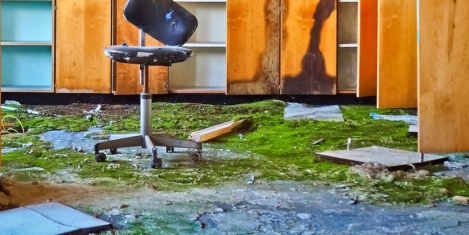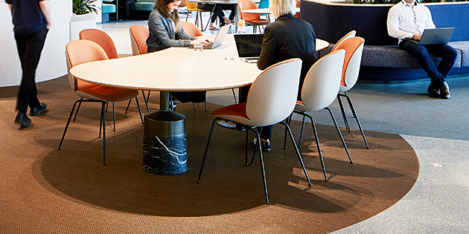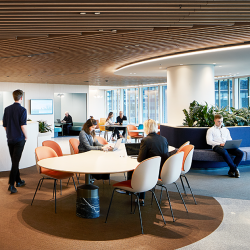August 13, 2021
The future of work will be shaped by the needs of workers
 As the UK government has withdrawn its advice for employees to work from home, more organisations than ever will be instituting what have become known as hybrid working models: 68 percent globally, according to research from Steelcase. Definitions of “hybrid work”, however, are often contradicting and unclear – leaving business leaders without definitive guidance about how to approach the future of work. To provide businesses with a more concrete view of what hybrid working looks like in reality, and provide tangible actions to help streamline productivity and collaboration, Steelcase have researched the experiences and needs of workers worldwide in their report: Changing Expectations and the Future of Work. More →
As the UK government has withdrawn its advice for employees to work from home, more organisations than ever will be instituting what have become known as hybrid working models: 68 percent globally, according to research from Steelcase. Definitions of “hybrid work”, however, are often contradicting and unclear – leaving business leaders without definitive guidance about how to approach the future of work. To provide businesses with a more concrete view of what hybrid working looks like in reality, and provide tangible actions to help streamline productivity and collaboration, Steelcase have researched the experiences and needs of workers worldwide in their report: Changing Expectations and the Future of Work. More →






 There was a spring in the step of the central London office market in Q2 2021 with more businesses committing to new office space, as plans to return to workplaces took shape. Research by
There was a spring in the step of the central London office market in Q2 2021 with more businesses committing to new office space, as plans to return to workplaces took shape. Research by 
 With much of Europe having worked remotely for over a year and many continuing to do so for the foreseeable future, new insights from
With much of Europe having worked remotely for over a year and many continuing to do so for the foreseeable future, new insights from 
 New research commissioned by
New research commissioned by 
 Research by
Research by 
 The commute as we knew it may be gone for good, claims new research conducted by
The commute as we knew it may be gone for good, claims new research conducted by 
 Over the past ten years, reuse of furniture and furnishings has been extremely limited. Most redundant assets have been discarded to landfill. It’s a brutal fact that it is the easy and less expensive option. Many products sent for recycling often end up in landfill or incineration and so still contributing to carbon emissions. As offices plan for
Over the past ten years, reuse of furniture and furnishings has been extremely limited. Most redundant assets have been discarded to landfill. It’s a brutal fact that it is the easy and less expensive option. Many products sent for recycling often end up in landfill or incineration and so still contributing to carbon emissions. As offices plan for 
 More than half (52 percent) of global companies anticipate a return to the office in earnest by the end of Q3 2021, according to new research by
More than half (52 percent) of global companies anticipate a return to the office in earnest by the end of Q3 2021, according to new research by 
 Taunton’s UK Hydrographic Office Headquarters was named ‘Best of the Best’ at the British Council for Offices’ (BCO) National Awards, and also took home the ‘Corporate Workplace’ award. The office was joined by six other award winners recognised as leading examples of excellence in the office space. This ‘roll of honour’ includes two buildings in London: The Brunel Building on Canalside Walk, and 160 Old Street, a refurbished office space in the “Silicon Roundabout” district.
Taunton’s UK Hydrographic Office Headquarters was named ‘Best of the Best’ at the British Council for Offices’ (BCO) National Awards, and also took home the ‘Corporate Workplace’ award. The office was joined by six other award winners recognised as leading examples of excellence in the office space. This ‘roll of honour’ includes two buildings in London: The Brunel Building on Canalside Walk, and 160 Old Street, a refurbished office space in the “Silicon Roundabout” district. 
 Major UK employers plan to reduce their office space by up to nine million square feet, equivalent to 14 Walkie Talkie buildings – the 37 floor high rise on London’s Fenchurch Street – according to
Major UK employers plan to reduce their office space by up to nine million square feet, equivalent to 14 Walkie Talkie buildings – the 37 floor high rise on London’s Fenchurch Street – according to 
 HR leaders, heads of real estate and IT decision-makers have not always spent huge amounts of time working together – their roles and responsibilities have often been siloed. But in the new world of work, that’s all changing. These three groups of senior leaders are being asked to collaborate on one of the biggest challenges corporate occupiers, as they try to figure out when and how to return to office-based working and shape the future of work. Failure to collaborate will increase the probability of workplaces having low occupancy rates, low employee engagement and decreased productivity.
HR leaders, heads of real estate and IT decision-makers have not always spent huge amounts of time working together – their roles and responsibilities have often been siloed. But in the new world of work, that’s all changing. These three groups of senior leaders are being asked to collaborate on one of the biggest challenges corporate occupiers, as they try to figure out when and how to return to office-based working and shape the future of work. Failure to collaborate will increase the probability of workplaces having low occupancy rates, low employee engagement and decreased productivity. 









August 23, 2021
Executives think work should be split 70:30 between office and home
by Neil Franklin • Comment, Flexible working